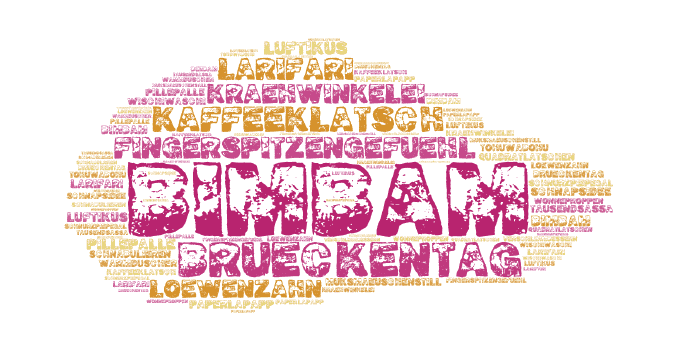
What a mouthful.Ī mnemonic device is just a trick you invent to help you remember something. The meaning of the word “donkey’s bridge” certainly isn’t obvious, but it’s a lot more approachable than our word for it – “a mnemonic device”. Let’s call that a naked snail ( Nacktschnecke).Īnd the one that spends the whole day eating – the wolverine – let’s name that the eat-a-lot ( Vielfraß). That thing that’s like a snail but hasn’t got a shell… yeah the one English people call a slug. What’s that animal that smells bad? A skunk you say? But isn’t “stink animal” so much more accurate? This one is beautifully blunt and gives you the impression that, when it came to naming animals in Germany, kids got to do it rather than scientists. Don’t worry, Germans aren’t that fussy about cleanliness! While you might at first guess that this is some strange device Germans use to help inspect every inch of the toilet bowl, it actually just means loo seat. How many of you were left wracking your brains at what on earth these dirty Klobrille (toilet glasses) could be?

That first house meeting with our German flatmates when the topic of cleaning comes up. Isn’t that just something for propping up your boobs? So it’s simpler to call it a Büstenhalter, (bust-holder) right? Even if that does make it sound a touch perverted. Then there is the German word for a brassiere. Why have a completely new word for things we put our hands in, when they are really just shoes for your hands? What do gloves and mittens even mean anyway? Moving on from our body to what we dress it in, Germans also like to keep the language absurdly simple. Nowadays Liebfraumilch is produced mainly for export. The name was initially given to the wine produced from the vineyards of the Liebfrauenkirche or “Church of our Lady” in Germany’s Rhine region. We guess that naming a wine after the milk that nurtured the baby Jesus is praise indeed. Translated from German, the name means ”Beloved Lady’s Milk” and refers to the Virgin Mary. Liebfraumilch is a semi-sweet white German wine that dates back to the mid 1700s. While we’re on the subject of breasts, this German wine appears to be a rather saucy reference to the teat of the Virgin Mary. It may seem crude to name such a sensuous part of the body after a viral growth, but, hey, whatever makes sense to Germans.Īnd it’s not the only term for a body part that sounds a little grim. Brustwarze literally translates as “breast wart”, and yes, it means nipple. The German language doesn’t mess around when it comes to body parts. Sometimes the meanings are obvious, while others are a little harder to grasp… That’s because, rather than inventing new words, Germans are big fans of creating compound words out of existing ones.Ī simple example of this is the German for compound word Wortzusammensetzung (word-together-setting). This word essentially means "a face that is begging to be punched." The word Backpfeife means either "punch or slap" and Gesicht means "face." The German punk bank, Die Ärzte, named one of its songs Backpfeifengesicht since the lyrics mention a person who's apparently wearing a stupid look that frustrates the singer.It may be a tricky language to master, but one of the great things about German is that you don’t actually need a particularly large vocabulary.

German dictionaries translate this word as the action of "grinning like a Cheshire cat" given the wide-sweeping smile from the Cheshire cat in "Alice and Wonderland." 6. Backpfeifengesicht If your mom embarrasses you in front of your friends, you're probably going to have a honigkuchenpferd-looking smile. 5. Honigkuchenpferdīy dissecting this word, you have "horse-shaped honey cake." Literally, it means having a giant dorky grin on your face. The word Erbsen means "peas" and Zähler means "tally." Therefore, an Erbsenzähler literally describes a person who counts their peas. In German, the word Frühj ahr means "springtime," and Müdigkeit means "tiredness." Conjoined, Frühjahrsmüdigkeit is "springtime lethargy." 4. ErbsenzählerĪnyone who's obsessed with details and a bit of a control freak would be referred to as an Erbsenzähler. This 18-letter word is used to describe a general sense of weariness in the springtime, specifically between mid-March through mid-April.


 0 kommentar(er)
0 kommentar(er)
